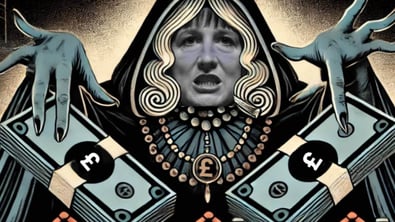Property investors are keeping a close eye on the mortgage rates as the economy goes through a turbulent few weeks and interest rates have risen.
Mortgage rates are expected to continue to rise, prompting many property investors to take action or at the very least monitor the situation.
What will mortgage rates rise to? This blog post investigates.
What is the mortgage rate?
According to Compare The Market:
“The mortgage rate is the amount of interest you’ll be charged on the loan against the property. Mortgage rates vary based on several factors, including your deposit amount, the length of your mortgage term and whether you’re choosing a fixed-term deal or variable rate.
“A fixed-term mortgage secures a guaranteed mortgage rate for an agreed term. This is typically two to five years, but some providers offer fixed-term mortgages from up to 15 years. The variable rate means your mortgage payments could go up or down, throughout your term, in line with the Bank of England base rate.”
How are mortgage rates determined?
There are multiple factors that influence how mortgage rates are determined.
Mortgage lenders consider variable associated with the borrower and wider market factors. These include:
Interest rates: The interest rate and mortgage rate tend to work in correlation. For variable rate mortgages any changes in interest rates (base rate) tend to have an immediate effect. This was seen in mortgage rates when the interest rate was 0.75%. The base rate was at an all-time low of 0.25% between August 2016 and November 2017. The result of this, if the customer is on a standard variable mortgage rates payments could rise by 0.25% (taking into account the jump from 0.5% to 0.75%). This is because the rise follows the Bank of England’s base rate. With a tracker mortgage, the rate could also rise by the same amount as the base rate. A rise in interest rates means it is beneficial for savings and detrimental for spending, which is designed to reduce the threat of inflation.
Market conditions: The overall state of the economy and the bond market are factors that influence the mortgage rate. Wider market factors such as economic policy have direct impact on consumer confidence and the prices at which rates can be charged.
Credit score: Mortgage lenders will check credit reports and scores before determining eligibility. The total of the credit score needed may vary depending on the mortgage.
Type of mortgage loan: Different types of mortgages are available and interest rate can vary depending on the loan type.
Repayment term: Many mortgages have a 15, 20 or 25 year repayment term. The longer the loan term, the higher the interest rate tends to be.
Loan interest rate type: Customers can choose a mortgage with a fixed or adjustable interest rate. The amount of interest paid on this can vary and also change over time.
Loan amount and loan-to-value: The size of the loan and the value of the home can impact the rates. Lenders will evaluate how much is borrowed and charge higher rates depending on whether it is a large or small loan.
Deposits: A larger deposit may contribute to a lower mortgage rate, depending on circumstances.
Location: Choosing one location over another may result in a small change in the rate.
Living in the home: Choosing whether to live in the property or using it as an investment will also influence the mortgage rate.
What are the changes in mortgage rates?
The changes to the interest rates will lead to independent adjustments of mortgage rates which will change depending on the lender.
The latest Bank of England base rate is 2.25%. This was an increase of 0.5%, announced on 22nd September.
Nationwide, for example, did the following with mortgage rates:
- The Standard Mortgage Rate (SMR) increased from 5.24% to 5.74%.
- The Base Mortgage Rate (BMR) increased from 3.75% to 4.25%.
- Tracker mortgage rates increased in line with the base rate.
What are mortgage rates going to increase to?
According to some news outlets, mortgage rates are to continue to increase.
“The jump in real interest rates sparked disfunction at the long end of the government bond market as defined-benefit pension funds faced margin calls on out-of-the-money interest rate swap positions related to liability-driven investment strategies. The Bank of England (BoE) was forced to announce a temporary intervention to buy up to £65 Billion of long-dated gilts to prevent a ‘doom loop’ of pension fund forced selling to raise collateral.
“We now expect much more rapid rises in the policy rate as the Bank of England seeks to offset the impact of looser fiscal policy and a weaker currency on inflation, buttress investor confidence in sterling assets and demonstrate its independence in the face of increased financial market concerns about fiscal dominance. We now anticipate the policy rate rising from 2.25% to 4.25% by December 2022 and 5.0% by the second quarter of 2023.
“Rising funding costs, tighter financing conditions, including for mortgage borrowers, and increased uncertainty will outweigh the impact of looser fiscal policy in 2023. Fitch sees the economy entering a recession from Q4 2022 as rapid rises compound the impact of the energy crisis and the contraction in the eurozone.”
“The average rate on a five-year fixed mortgage rate is forecast to rise by 0.3% this year, rising further to just over 1% next year and go up to 2% in 2024.
“And with the Bank of England’s monetary policy committee set to meet again on 3rd November, this is predicted to increase, but more slowly than the market consensus.
“Earlier this year, the Financial Conduct Authority (FCA) said it expects an average base rate of 3%, with a range between 2.5% and 4%, meaning the cost of borrowing money will be higher as banks inevitably pass on their costs to customers.
“Inflation is expected to drop in future years, which means borrowers could face even higher repayments should they renew their loans.
“But homeowners who have been struggling to pay off their mortgages may feel some relief. One mortgage rate forecast is that lenders are expected to offer lower interest rates on new deals, so borrowers may be able to afford larger loans than before.”
What is causing the interest rate rise?
The Bank of England has been increasing interest rates to combat inflation.
Prices are going up quickly around the world. This is partly due to positive things, such as the mass-release of Covid restrictions, so consumers are spending more. There is no better example of this than the house price bubble.
However, many firms are having problems getting enough goods to sell. With more buyers chasing too few goods, prices have increased.
There has also been a sharp increase in oil and gas prices – worsened by Russia’s invasion of Ukraine.
The rising interest rates helps to control inflation by making it more expensive to borrow money. This encourages people to borrow and spend less and save more.
However, the Bank of England does not want to slow the economy too much.
Inflation also ties in with the exchange rate.
Investors are worried that the UK is borrowing too much money. The drop in Sterling is a problem as a weak pound makes it more expensive to buy imports (such as crude oil and food). This increases inflation so the Bank of England may feel the need to increase interest rates to push inflation back down.
Tax cuts could also drive inflation by giving people more money to spend – which gives the Bank of England another reason to put up rates.
How much could a mortgage cost every month?
With lenders anticipating higher rates, new deals are more expensive.
An average two-year fixed deal was 2.29% in November last year is now 4.24% – which equates to hundreds of pounds per month difference in monthly repayments.
Over the last month many lenders have pulled deals whilst prices are recalculated.
What should property investors do?
There are plenty of opportunities for property investors.
The increased difficulty for individuals to get onto the housing ladder, as the cost of new mortgages increase, the more individuals will enter the rental market.
An increase in renters providers a great opportunity for Buy To Let property investors, with greater competition and the potential to charge a higher price.
As incomes are affected, buying habits also change.
With income being squeezed, there may be a shift from international holidays to UK-based serviced accommodation.
This has been the case during previous recessions. During 2007-2014, Britons holidaying abroad went down 18%. In the same period, staycation breaks were up 5.6% with total tourism revenue up 12.6%.
What are the next steps?
Access your free Wealth Through Property e-book to start your property journey here.
For more information call us on 01302 897131 or email office@touchstoneeducation.co.uk.












